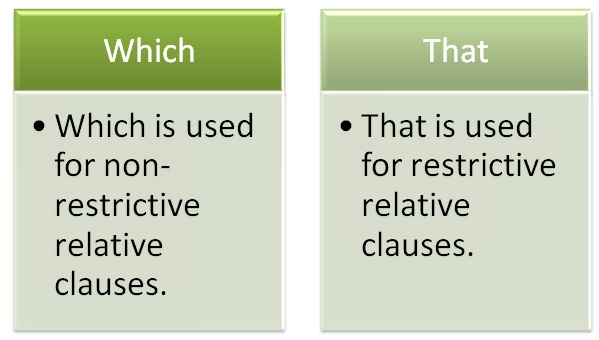The key difference between which and that is their usage; we use that when there is necessary information in the clause you are adding while we use which when there is extra information and non-essential information in the clause you are adding. Since people often mix up the two relative pronouns which and that in writing sentences, getting to know the difference between which and that is only going to help you to use English correctly and with more understanding. You should always remember that there is a subtle but important difference between which and that when used in a sentence.
Key Takeaways
- Which is used for non-restrictive relative clauses, giving additional, non-essential information.
- That is used for restrictive clauses, adding essential information about a clause.
- To determine which pronoun to use, consider whether the information is essential or not and whether it requires a comma.
What Does Which Mean?
The relative pronoun which is used for non-restrictive relative clauses. Let’s first see what is a non-restrictive clause and a restrictive clause.
A clause is a part of a sentence; a relative clause tells us which person or thing (or what kind of person or thing) the speaker is referring to. There are two types of the relative clause, restrictive and non-restrictive. Non-restrictive clauses give additional information about something, not essential information.
Example Sentence 01: He loves Sushi, which is a traditional Japanese dish.
For example,
“James told me about his new job, which he’s enjoying very much.”
“His car, which was admired by everyone, was stolen yesterday.”
In these sentences, the relative clauses do not tell you which things the speaker means. We already know which things are meant; James’s job and his car. These are additional information. The relative clauses here give additional information, not essential information. These are non-restrictive clauses. Moreover, we use a comma with these clauses.
What Does That Mean?
The relative pronoun that is used for restrictive clauses. A restrictive clause adds essential information about a clause. For example,
Where is the nearest shop that sells newspapers?
Kathy works for a company that makes furniture.
The above sentences contain restrictive clauses. They add essential information to the sentences. Moreover, we do not use commas with these clauses.
Example Sentence 02: Here’s a shop that sells flowers
To make it easier to remember, whenever the information you want to communicate is essential in identifying the noun, the proper pronoun to use is ‘that.’ If the information is not essential, or can be set apart with commas, then the pronoun ‘which’ is more likely to be correct.
If you are not sure whether the relative clause is essential or not, you can simply try by removing the relative clause and ask yourself if the sentence sounds complete and informative.
What is the Difference Between Which and That?
Which is used with a comma for non-restrictive relative clauses while that is used without comma for restrictive relative clauses. This is the key difference between which and that. Moreover, we use that when there is necessary information in the clause you are adding while we use which when there is extra information and non-essential information in the clause you are adding.
Summary – Which vs That
If you get a clear idea about restrictive and non-restrictive clauses (restrictive – necessary; non-restrictive –extra & non-essential), then all that you need to remember is use ‘that’ without comma for restrictive relative clause and if the clause is non-restrictive relative use ‘which’ with a comma.
Image Courtesy:
1. “5895331” (CC0) via Pixabay
2. “154528” (CC0) via Pixabay
Further Reading:
Difference Between Which and What
Difference Between Which and In Which in English Grammar
Difference Between Which and Who in English Grammar
Difference Between This and That in English Grammar
Difference Between It and That
Related posts:
Difference Between Affect and Effect in English Grammar
